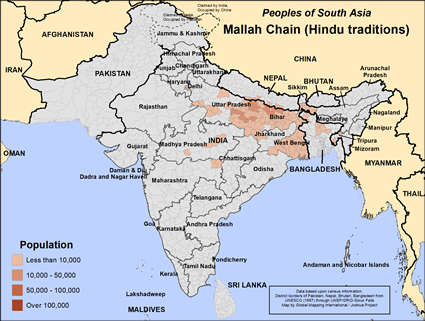Mallah Chain (Hindu traditions) in India

Send Joshua Project a photo
of this people group. |

Map Source:
People Group data: Omid. Map geography: UNESCO / GMI. Map Design: Joshua Project
|
| People Name: | Mallah Chain (Hindu traditions) |
| Country: | India |
| 10/40 Window: | Yes |
| Population: | 334,000 |
| World Population: | 340,500 |
| Primary Language: | Hindi |
| Primary Religion: | Hinduism |
| Christian Adherents: | 0.00 % |
| Evangelicals: | 0.00 % |
| Scripture: | Complete Bible |
| Ministry Resources: | Yes |
| Jesus Film: | Yes |
| Audio Recordings: | Yes |
| People Cluster: | South Asia Hindu - other |
| Affinity Bloc: | South Asian Peoples |
| Progress Level: |
|
Introduction / History
According to the Ramayana, one of the two major ancient Sanskrit epics, there was a boatman named Nishad who was asked by Lord Rama and his wife Sita for a ride across the Ganges River. To Lord Rama's astonishment, the boatman refused. Nishad explained that he feared that the touch of the deity's foot might destroy the boat, and then Nishad would be left without a means of supporting his family. Rama assured Nishad that no ill would befall him, so the humble boatman ferried Rama and Sita across the river. The Mallah live throughout India and in the smaller nations of Sri Lanka and Nepal. Their population is concentrated in the northern and eastern Indian states of Bihar and Uttar Pradesh. The primary language of the Mallah is Hindi. They also speak the local languages of where they live. Many resources are available in Hindu including a complete Bible, radio programs and the JESUS Film. A tiny fraction of the Mallah claim to be believers in Jesus. Many Mallah are unable to read or write so the gospel will have to be presented to them in oral and visual forms. The Mallah are classified as a Backward Scheduled Caste meaning that they are eligible for public jobs and special consideration for university admissions.
What Are Their Lives Like?
Today most Mallah make their living as either fishermen or farmers. They cultivate land that is owned by others. They sell fish and produce in the markets. Some are day laborers and boatmen who carry people across lakes and rivers without bridges. Their women and children sell flowers and incense at Hindu festivals. Marriages are usually arranged by family leaders. The Mallah generally have large families. The Mallah people are monogamous meaning that marriage is between one man and one woman. The divorced and bereaved can marry again. On the death of the father, sons inherit the property with the oldest son taking charge of the home. The dead can be either cremated or buried. They have a caste council that settle their legal disputes and promotes their interests.
What Are Their Beliefs?
The Mallah practice Hinduism, the ancient religion of India. Their brand of Hinduism has elements of folk religion. They worship and serve the gods of the Hindu pantheon. Hindus believe that by performing rituals and good works that they will attain moksha or freedom from the endless cycle of birth, death and rebirth. The Mallah visit Hindu temples and offer prayers, food, flowers, and incense to their gods in hopes of gaining protection and benefits. They do not have a personal or familial relationship with their gods as Christians do. There are many forms of Hinduism, each with its own deities and beliefs. The main yearly holidays of the Mallah people are Holi, the festival of colors and the start of spring, Diwali, the festival of lights, Navratri, the celebration of autumn and Rama Navami, Rama's birthday. The caste system divides Hindus into four main categories. The lowest communities are outside of the caste system. The Mallah fit into the Shudra caste or sometimes outside the caste system.
What Are Their Needs?
As a poverty stricken and poorly educated Indian people, the Mallah have many spiritual and physical needs. They need to learn the basics of reading and writing to improve their position in society. They need to learn new job skills. They need the benefits of modern medicine. Most of all they need to hear and understand the life changing message of Jesus Christ. He alone can forgive their sins and give them the hope of eternal life.
Prayer Points
Pray that the Mallah caste councils will give their lives to Jesus Christ and lead their community into a movement to Christ. Pray that God will give them dreams and visions about the one, true God leading them to salvation. Pray for a church planting movement in their community this decade. Pray the Lord provides the means for Mallah parents to meet the needs of children.